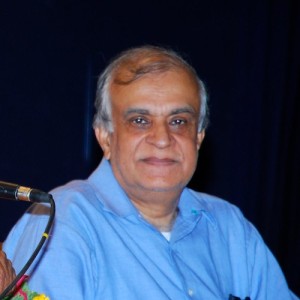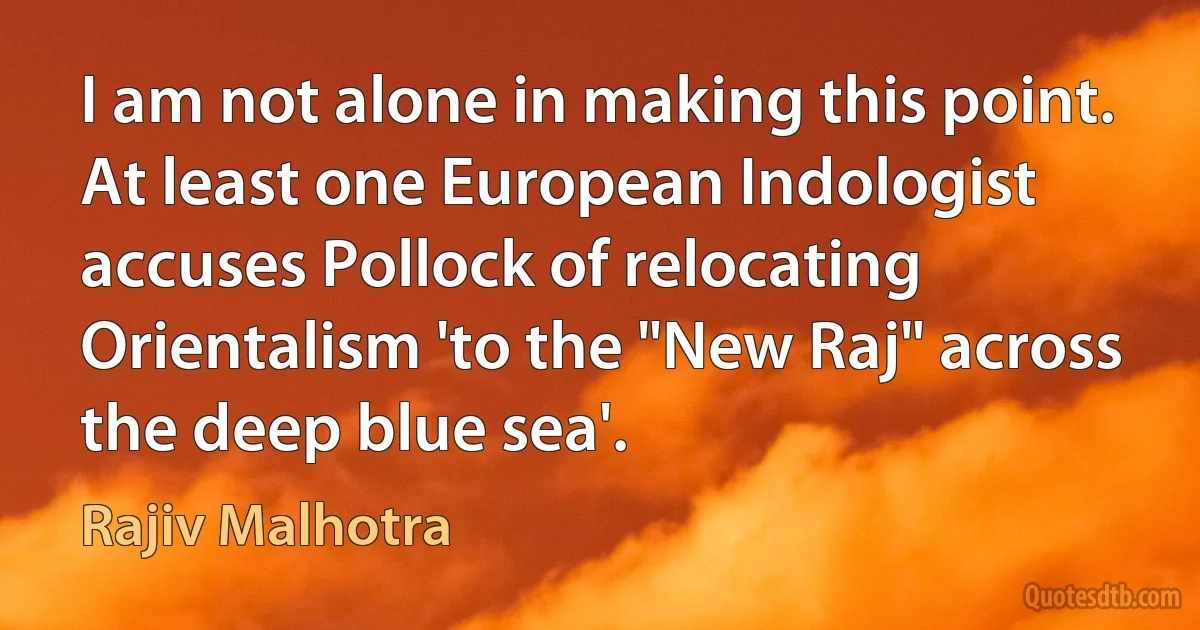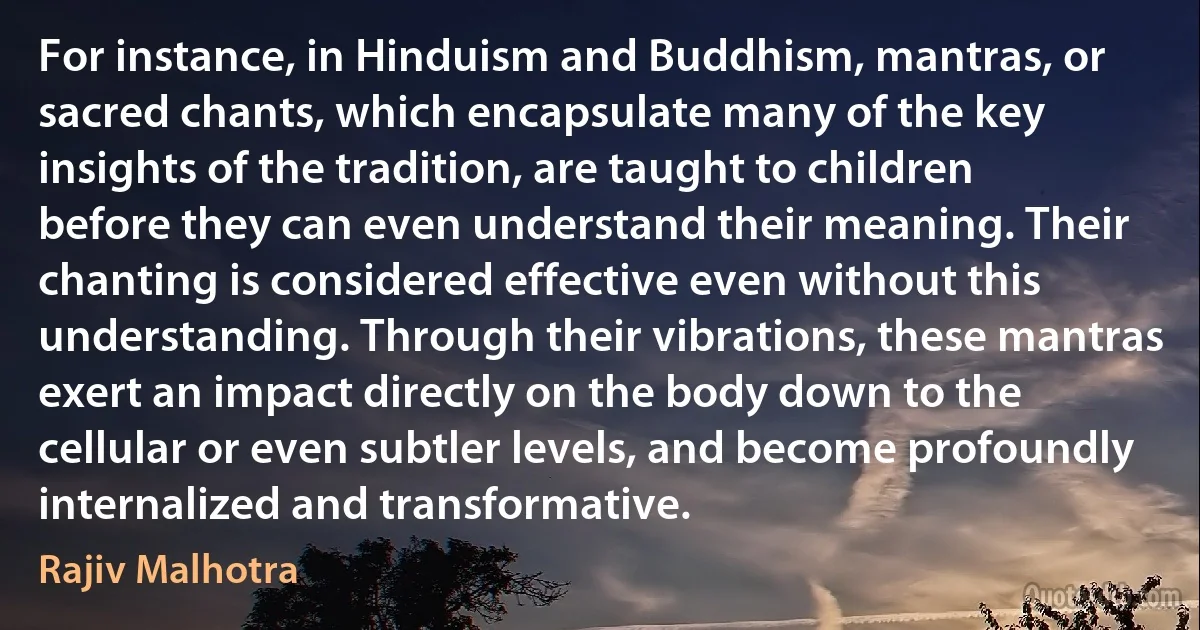Rajiv Malhotra quotes - page 2
He [Grünendahl] says Pollock's narrative 'is not an evidence-based study of Orientalism or Indology in Germany, but a sophisticated charge of anti-Semitism based largely on trumped-up "evidence".... Pollock's post-Orientalist messianism would have us believe that only late twentieth-century (and now twenty-first century) America is intellectually equipped to reject and finally overcome [‘Eurocentrism'...] The path from the 'Deep Orientalism' of old to a new 'Indology beyond the Raj and Auschwitz' leads to the 'New Raj' across the deep blue sea.

Rajiv Malhotra
Thus, Grünendahl has noted Pollock's tendency to develop broad narratives without any supporting evidence. Moreover, he draws attention to Pollock's messianism in promoting American scholarship...., casting doubt on Pollock's attempt to analyse Sanskrit objectively. He raises the pertinent question as to whether Pollock is providing the intellectual foundations for America's 'New Raj', to replace the dead British Raj - i.e., whether American imperialism is replacing the dead British imperialism.

Rajiv Malhotra
It seems obvious that Pollock is committed to the Marxist theory linking literary works and political power. He wants to deploy it as his lens for analysing how the aesthetic use of languages in India became interwoven into the fabric of politics. At a deeper level, beyond the aesthetic and political usage of Sanskrit, he finds that old Marxist demon: theology. For him, as for most Marxist-oriented scholars, all forms of spirituality/transcendence are, in effect, irrational, deformed and mystified ways of thinking....

Rajiv Malhotra
Many similar views were also expressed in the Sanskrit Commission Report written under the Nehru government in the 1950s. That report declares: "The State in ancient India, it must be specially pointed out, freely patronised education establishments, but left them to develop on their own lines, without any interference or control. It says that until the British disruption, the salient features of our traditional education included: 'oral instruction, insistence on moral discipline and character-building, freedom in the matter of the courses of study, absence of extraneous control...' ... We can never insist too strongly on this signal fact that Sanskrit has been the Great Unifying Force of India, and that India with its nearly 400 millions of people is One Country, and not half a dozen or more countries, only because of Sanskrit.'

Rajiv Malhotra
I do not contest that this top-down instrumental use for pure politics was being made to some degree; but to reduce the entire process of cultural evolution to a matter of politics betrays a profound misunderstanding. This view disregards the intrinsic appeal of the Sanskrit tradition, including for non-elites, and the various roles it played in the cultures it touched. In particular, to dismiss the entire symbolic discourse of Sanskrit as 'mystifying' is to apply a reductive Marxism that cannot account for sacredness in the lives of people.

Rajiv Malhotra
When it was my turn to speak, I recommended that the term 'tolerance' in the resolution be replaced with the phrase 'mutual respect'. .... As I noted, we 'tolerate' those we consider not good enough, but we do not extend our respect to them. 'Tolerance' implies control over those who do not conform to our norms by allowing them some, though not all, of the rights and privileges we enjoy. A religion which involves the worship of 'false gods' and whose adherents are referred to as 'heathens' can be tolerated, but it cannot be respected. Tolerance is a patronizing posture, whereas respect implies that we consider the other to be equally legitimate – a position which some religions routinely deny to others, instead declaring these 'others' to be 'idol worshippers' or 'infidels' and the like.

Rajiv Malhotra
She wrote: 'In the course of our conversation about effective interfaith dialogue, he [Rajiv Malhotra] pointed out that we fall short in our efforts to promote true peace and understanding in this world when we settle for tolerance instead of making the paradigm shift to mutual respect. His remarks made me think a little more deeply about the distinctiveness between the words "tolerance" and "respect", and the values they represent.' Haag went on to explain that the Latin origin of 'tolerance' referred to enduring, which, though a laudable idea, did not connote mutual affirmation or support. '[The term] also implicitly suggests an imbalance of power in the relationship, with one of the parties in the position of giving or withholding permission for the other to be.' She then explained that the Latin word for respect meant holding someone in esteem and that the term 'presupposes we are equally worthy of honor. There is no room for arrogance and exclusivity in mutual respect.'

Rajiv Malhotra
It is through Western categories, and hence the Western 'gaze', that the people who constitute the Judeo-Christian traditions see the world. This gives the Western perspective a de facto status as arbiter of what is considered universally true. When another civilization is the object of such a gaze, it becomes relative and no longer universal. Indeed, its depiction as the alien makes it interesting precisely because it is particular and not universal.

Rajiv Malhotra
The metaphor of Indra's Net also suggests a creative intelligence which is omnipresent, permeating all life. All appearances of separateness are maya (illusory). The capacity of one jewel to reflect the light of every other within this infinite net is difficult for the linear mind to comprehend, but it serves as an apt precursor to an understanding of multidimensional theories which have emerged in physics and metaphysics.
Thus, long before modern science, Indra's Net provided an excellent metaphor for what is now recognized as the main quality of the hologram, which is that every area of the hologram contains information on the whole.

Rajiv Malhotra
In Hindu marriages, for instance, unlike the nuptials of Christianity, the priest does not perform the rituals, nor does he have the authority to declare the couple married; he acts only as the coach. The groom and bride themselves perform the ceremony. In other words, there is no external authority declaring them man and wife. The same do-it-yourself freedom is evident in other pursuits, such as yoga and meditation. Even in formal worship, the guidelines are meant for beginners, and these give way to increasing freedom as the individual becomes self-propelled in the spiritual journey without need for external authority.

Rajiv Malhotra
Sanskriti has had an obvious influence on Thailand dating from 1500 ce. Sanskrit was used for public social, cultural, and administrative purposes in that country and other parts of South-east Asia. Today, Sanskrit is highly respected as the medium for validating, legitimating and transmitting royal succession and instituting formal rituals. Khmer society (in Cambodia) was highly Indianized, and the later Thai kings embraced the Indian religions and based their principles of government on Hindu practices.

Rajiv Malhotra
The notion of individualism that has emerged in the West is a relatively recent development even though it is often claimed to be derived from classical antiquity and Abrahamic theological tenets. This revisionist claim of being the exclusive and defining feature of the West – in contradistinction to the putative Oriental lack of individuality – is the result of myth-making.

Rajiv Malhotra
The book is one of the few attempts by an Indian intellectual to challenge seriously the assumptions and presuppositions of the field of India and/or South Asian studies tout ensemble, including not only the work of European and American scholarship but as well the neocolonialist, postmodernist and subaltern ressentiment so typical of contemporary Indian intellectuals... The book will be controversial on many different levels and will undoubtedly elicit rigorous critical response'.

Rajiv Malhotra
So impressive was Ashoka's example that many other Asian monarchs adopted it. Japan's Prince Shotuku, for example, used it to unify the Japanese nation and improve international relations. For this policy, the renowned historians Arnold Toynbee and H.G. Wells have called Ashoka the greatest monarch who ever lived. Furthermore, when India commanded superiority in the eyes of the nations that wanted to receive its Buddhist civilization (such as China, Mongolia, Cambodia, Indonesia and Thailand), there was never any attempt to impose rulers or governance on others, or ask for taxation or tribute to any Indian nexus, or subvert the native cultures, languages and histories of those nations. The contrast between this and the manner in which Western civilization has spread is stark and warrants greater attention.

Rajiv Malhotra
Since every root sound has a distinct meaning, its signature is found in all the words derived from it. It is theoretically possible to explain the meaning of the words according to the algebraic combination of letters, syllables and roots. This transparency of rootsounds and semantics follows a natural process and gives Sanskrit the ability to discover its own history. Consequently, Sanskrit is an ever-creative language in which each word is the parent and creator of ideas. A letter is called 'akshara', which literally means imperishable or eternal. Akshara is the eternal sound, and it does not perish but reveals the whole secret of speech. Another term for letter is 'varna', which means hue or colour. Thus, every letter is heard as a sound and has a visual hue as it manifests. The rishis are said to have seen, and not just heard, the Vedas. The term for alphabet, 'varnamala', literally means 'garland of colours' or qualities or hues which the artist uses to paint reality.

Rajiv Malhotra
. In the case of India, the Joshua Project points its finger at Hindus who comprise the dominant faith and are clearly targeted as competitors to overcome. This is particularly ironic given that Hinduism has a reputation for embracing and receiving other faiths, including Christianity. Yet when incidents of violence have occurred, it is often the Christian missionaries who cast the first stone in the form of hate speech such as 'pagan', 'idol-worshipper', 'heathen', etc. – systematically belittling Indian deities, symbols and traditions and offering whole villages financial incentives to convert. But rarely is any of this provocation ever mentioned. What is carefully documented and publicized instead are the half-truths, for example, that a Christian was attacked for merely being so.

Rajiv Malhotra
Western academics not only produce critical editions of dharma texts but determine the very categories of the discourse, the manner in which complex words and situations are contextualized, what is included as interesting and relevant (and what is left out), which social theories and textual hermeneutics are to be used, and who the authorities are in matters of interpretation. Engaging in sweeping generalizations, the Western academy routinely passes judgement on whether Hinduism is a legitimate religion, how and when it should be discussed (if at all), and who its authorized spokespersons are. All of this causes many in the dharmic traditions to doubt the legitimacy of their culture, especially in relation to the established, prevailing taxonomy.

Rajiv Malhotra
Here then is a meritorious role that Malhotra has increasingly played since he started his series of books: getting Hindus up from their cosy unconcern and into reality. In particular, he has taught them to scan the forces in the field and take an objective look at the hostile agents approaching Hindu society with flattering smiles and on idealistic-sounding pretexts.

Rajiv Malhotra
The LGBTQ movement also has legitimate gripes in the West. The same framework for activism, however, cannot be blindly applied to India where the tradition has had a far more complex posture on homosexuality that is vastly different from the closedmindedness in the Abrahamic religions. I.

Rajiv Malhotra
Rajiv Malhotra

Photo:
Sparkume,
CC BY-SA 3.0
Occupation: Indian-American Entrepreneur
Born: September 15, 1950
Quotes count: 49
Wikipedia: Rajiv Malhotra



